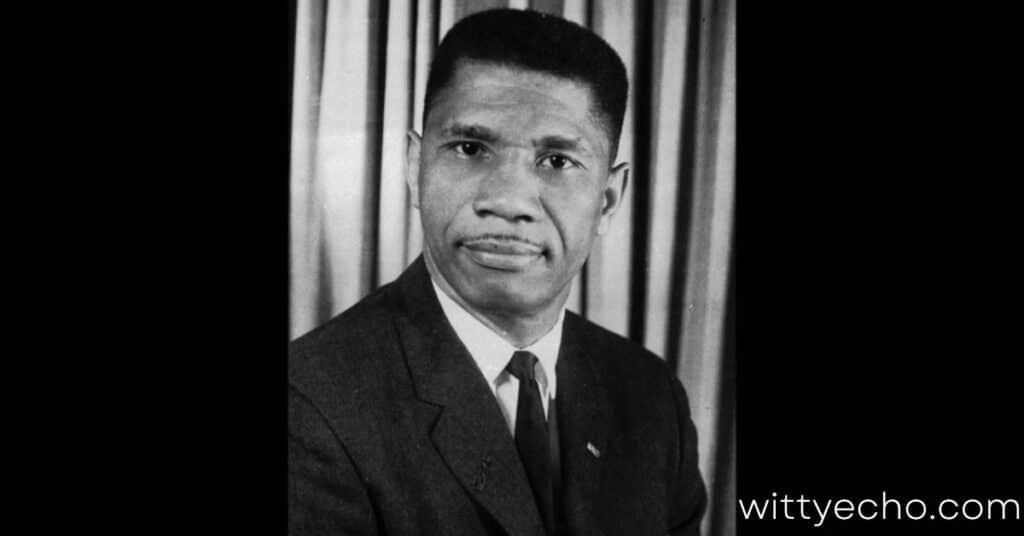Medgar Evers, a towering figure in the Civil Rights Movement, lived and died in the name of equality and justice. His powerful words continue to resonate with those fighting for social justice and racial equality. In this post, we’ll explore his life, legacy, and the impactful Medgar Evers Quotes: Words of Courage and Equality that have left an indelible mark on history. Through his eloquence and courage, Medgar Evers’ words remain as potent today as they were in the fight against segregation and Jim Crow laws.
Who Was Medgar Evers?
Quick Facts:
| Full Name | Medgar Wiley Evers |
| Born | July 2, 1925 |
| Died | June 12, 1963 (Assassinated) |
| Occupation | Civil Rights Activist, NAACP Leader |
| Education | Alcorn College |
| Spouse | Myrlie Evers |
Born in Mississippi on July 2, 1925, Medgar Evers grew up in a deeply segregated South, where the Jim Crow laws were in full force. From an early age, he experienced firsthand the racial discrimination that plagued African Americans. He served in World War II, fighting for freedom abroad, only to return home to a country that denied him and other African Americans basic human rights.
“You can kill a man, but you can’t kill an idea.” — Medgar Evers
After completing his studies at Alcorn College, Evers became deeply involve in the NAACP (National Association for the Advancement of C*lored People). His drive for social justice grew as he witnessed the struggles of African Americans in the South, who faced racial segregation and disenfranchisement. He dedicated his life to breaking these barriers and empowering his community.
The Role of Medgar Evers in the Civil Rights Movement
As the first field secretary for the NAACP in Mississippi, Evers was instrumental in organizing grassroots campaigns for racial equality. He worked tirelessly to combat racial segregation and to promote voting rights for African Americans. His efforts helped set the foundation for the larger Civil Rights Movement, including initiatives that tackled voter suppression and educational inequality.
“Our only hope is to control the vote.” — Medgar Evers
One of his notable campaigns involved desegregating the University of Mississippi. Evers supported James Meredith’s efforts to enroll, facing extreme opposition and violence from segregationists. His role in organizing boycotts and protests against businesses that practiced segregation placed him in the crosshairs of white supremacists, showcasing the principles behind Medgar Evers Quotes: Words of Courage and Equality.
Key Contributions:
- Voter Registration Drives: Evers helped countless African Americans register to vote, directly challenging the discriminatory laws that kept them from the polls.
- Economic Boycotts: He led boycotts against businesses that refused to hire African Americans or served them in a segregated manner.
- Public Education: Evers advocated for equal access to education, believing that it was the key to breaking the cycle of poverty and oppression in Black communities.
The Assassination of Medgar Evers
On June 12, 1963, Medgar Evers was assassinated outside his home in Jackson, Mississippi, by Byron De La Beckwith, a member of the Ku Klux Klan. Evers had just returned from an NAACP meeting when he was shot in the back. His murder shocked the nation and became a turning point in the Civil Rights Movement.
“When you hate, the only person that suffers is you.” — Medgar Evers
The fight for justice in Evers’ murder case was long and arduous. Byron De La Beckwith was tried twice in the 1960s, but both trials ended in hung juries. It wasn’t until 1994, more than 30 years later, that Beckwith was finally convicted for the murder of Medgar Evers, thanks to the tireless efforts of his widow, Myrlie Evers, and attorney Thurgood Marshall.
Timeline of Events:
| Date | Event |
| June 12, 1963 | Medgar Evers assassinated in Jackson, Mississippi |
| 1964 & 1965 | Two mistrials for Byron De La Beckwith |
| 1994 | Beckwith finally convicted and sentenced to life in prison |
| Posthumous Honors | Evers buried with full military honors in Arlington National Cemetery |
Medgar Evers’ Enduring Legacy
Evers’ legacy lives on not only in the history books but in the continued fight for racial equality. His widow, Myrlie Evers, became an important figure in the Civil Rights Movement, later serving as the national chairperson of the NAACP. Evers’ life and words have inspired countless activists and leaders, including those involved in the modern fight for civil rights and social justice, such as the Black Lives Matter movement.
“If I die, it will be for something.” — Medgar Evers
Thurgood Marshall once said that Medgar Evers’ sacrifice laid the foundation for many legal victories in the fight against racial injustice. Schools, scholarships, and even streets have been named in his honor, ensuring his spirit of activism continues to inspire.
Institutions Named After Medgar Evers:
- Medgar Evers College in Brooklyn, New York
- Medgar Evers Boulevard in Jackson, Mississippi
- Medgar Evers Historic Home in Jackson, a National Historic Landmark
Medgar Evers Quotes: A Call to Action
Evers’ words are a testament to his belief in the power of the people and the necessity of standing up for what is right. Each quote encapsulates his unyielding commitment to civil rights and social justice.
“Freedom has never been free.” — Medgar Evers
Whether speaking out against segregation, advocating for voting rights, or demanding justice for African Americans, his words still serve as a rallying cry for those fighting against racial inequality.
Notable Quotes:
- “I don’t know if I’m going to heaven or to hell, but I’m going from Jackson.”
- “The gifts of God should be enjoyed by all citizens in Mississippi.”
- “You can kill a man, but you can’t kill an idea.”
Quotes About the South and Its Racial Struggles
Medgar Evers knew the South better than most. He lived in Mississippi, a state that was a battleground for the Civil Rights Movement. His quotes about the South reflect a deep understanding of the region’s pain. They also express his belief in its potential for change.
“The state of Mississippi has no right to deprive its citizens of any rights.” — Medgar Evers
He was acutely aware of the racial tension in the South. Jim Crow laws and segregation created an environment where African Americans were second-class citizens. Yet, he remained hopeful that change was possible, even in the most difficult of circumstances.
Civil Rights Quotes by Medgar Evers
Evers was a voice for the voiceless. His quotes about the Civil Rights Movement provide insight into his mindset during some of the movement’s most trying times. He believed deeply in non-violent resistance, but he was also practical in understanding the risks of activism.
“It may sound funny, but I love the South. I don’t choose to live anywhere else. There’s land here where a man can raise cattle and get cotton, corn, and hay. I like that.” — Medgar Evers
Evers fought tirelessly against racial discrimination and worked alongside other civil rights leaders to bring an end to racial segregation. His quotes are both reflective and proactive, urging action even when the risks seem insurmountable.
Other Powerful Quotes by Medgar Evers
Medgar Evers wasn’t just focused on politics and civil rights. His quotes also reflect his thoughts on perseverance, courage, and the human spirit. His resilience in the face of danger shines through his words. They continue to inspire people today to stand up for justice, even when the odds are stacked against them.
“Racism is man’s gravest threat to man – the maximum of hatred for a minimum of reason.” — Medgar Evers
These quotes transcend his time, addressing universal truths about human dignity and equality.
The Power of Medgar Evers’ Legacy
Medgar Evers’ legacy is more than just a memory; it’s a call to action for current and future generations. His tireless advocacy for racial equality and social justice still reverberates in today’s society. Through ongoing civil rights movements, Evers’ vision for a fair and equitable society lives on. This spans from the early days of the NAACP to the modern push for justice seen in initiatives like the Black Lives Matter movement.
“You can’t stand still, you must be moving.” — Medgar Evers
This powerful quote encapsulates his relentless pursuit of progress. Despite constant threats, violence, and even death, Medgar Evers never gave up on his mission to secure freedom and equality for African Americans.
The Medgar Evers Case Study: A Model of Activism
Evers’ work in Mississippi and across the United States is an invaluable case study in effective activism.As an NAACP field secretary, Evers developed effective strategies for activism. He organized boycotts and educated people about their voting rights. He also raised awareness of racial injustices. His work embodies the spirit of Medgar Evers Quotes: Words of Courage and Equality.
Key Takeaways from Medgar Evers’ Activism:
- Grassroots Organization: Evers focused on community involvement, rallying local citizens to make their voices heard, a tactic still used today in protests and voter registration drives.
- Courage in the Face of Danger: Despite death threats and a violent atmosphere, Evers continued his work, showing the importance of perseverance.
- Coalition Building: Evers worked alongside other civil rights leaders like Thurgood Marshall, proving that collaboration is key in fighting systemic injustice.
- Legal Challenges: The legal fight for his murder conviction, which lasted over 30 years, shows how long and difficult the road to justice can be but also highlights the importance of unwavering persistence in the fight for what’s right.
“I love my country and I want to make it a better place.” — Medgar Evers
This case study of Evers’ efforts is a blueprint for activists today. His approach offers lessons in how to confront oppression with organized resistance, building upon each success to create lasting change.
Medgar Evers’ Legacy in Modern Civil Rights Movements
The struggles of Medgar Evers and his fellow activists laid the groundwork for the Civil Rights Movement. Their contributions are still felt today. Modern movements addressing police brutality, racial profiling, and voter suppression are extensions of Evers’ mission for equality. They echo Medgar Evers Quotes: Words of Courage and Equality.
“When will people stop being afraid of each other?” — Medgar Evers
Movements such as Black Lives Matter echo Evers’ message, focusing on the systemic injustices faced by African Americans. His work in advocating for voting rights is particularly relevant today as activists continue to combat voter suppression laws that disproportionately affect marginalized groups.
How Evers’ Work Influences Today’s Movements:
- Fighting for Voting Rights: Evers’ push to get African Americans registered to vote in the face of intimidation mirrors modern efforts to oppose new voter suppression tactics.
- Pushing for Racial Equality in the Legal System: The 1994 conviction of Byron De La Beckwith was a significant legal victory, and today’s activists continue to call for accountability in racially motivated crimes.
- Demanding Social Justice: Evers’ belief that “justice must be done” is at the heart of ongoing efforts for equal treatment under the law for all racial and ethnic groups.
Medgar Evers’ Influence on Future Leaders
From political leaders to grassroots activists, Medgar Evers has inspired countless individuals to dedicate their lives to social justice. His widow, Myrlie Evers, took up his cause after his assassination and continued to lead the fight for civil rights, becoming a significant figure in the NAACP.
“We are still fighting for the same things my husband fought for over 50 years ago.” — Myrlie Evers
Beyond his immediate family, Evers’ courage inspired many of the leading figures in the fight for racial equality. Today, his story is taught in schools and his name honored in public spaces.But more importantly, his ideas and Medgar Evers Quotes: Words of Courage and Equality continue to ignite passion in those who seek to make the world a more just place.
Influential Figures Who Were Inspired by Evers:
- Barack Obama: The former president often cited the legacy of civil rights activists like Evers as pivotal in his own journey toward leadership.
- John Lewis: The late Congressman and civil rights leader echoed Evers’ call for “good trouble” in his lifelong fight for justice.
- Stacey Abrams: Her work in combating voter suppression in Georgia and beyond mirrors Evers’ earlier efforts to ensure equal voting rights for all.
“The struggles we face are not new, but they are necessary.” — Medgar Evers
Continuing Medgar Evers’ Mission
Medgar Evers may be gone, but his mission for racial equality and social justice lives on. His legacy teaches us that the fight for civil rights is ongoing, and that each of us has a role to play in making society more fair and just.
“We must teach our children to live in a world of racial equality and justice.” — Medgar Evers
For activists, scholars, and everyday citizens, his words offer both inspiration and guidance in the face of adversity. The values he stood for—courage, justice, and equality—are as important today as they were during his lifetime.
What Can You Do?
- Educate Yourself and Others: Read more about Medgar Evers and the Civil Rights Movement.
- Engage in Social Justice: Join local organizations that work to fight racial inequality.
- Support Voting Rights: Advocate for fair and equal access to voting in your community.
Conclusion
Medgar Evers’ words continue to echo in the struggle for justice, equality, and freedom. Although tragedy cut his life short, his legacy endures. His quotes remind us that the fight for civil rights is far from over, and his unwavering courage is a model for future generations to follow.
“I’m looking to be free. We have a long fight ahead of us.” — Medgar Evers
Through his work, Medgar Evers stands as a champion of equality. His sacrifice shows his commitment. His words inspire many. He embodies moral courage.
“I’m not just fighting for my people, I’m fighting for all people.” — Medgar Evers
Take Action:
- Learn More: Read more about the Civil Rights Movement and the role of figures like Medgar Evers.
- Support Justice Movements: Engage with modern social justice movements that continue Evers’ work.
Discover exciting changes on the Mcdo menu with fresh beverage options. Explore new flavors that cater to diverse taste buds. Quench your thirst with refreshing drinks that promise an enjoyable dining experience.
In the world of fast food, McDonald’s is continuously redefining its offerings, especially in the beverage department. Whether you’re grabbing a quick meal or just popping in for a refreshing drink, McDonald’s beverages can surprise and delight your taste buds. Let’s dive into some of their latest innovations in drinks, which are making waves with their unique flavors and refreshing choices.







